The LCD inverter board on my laptop is dead. I am in the middle of nowhere and cannot find a replacement. Not at Fry’s. Not anywhere. Efforts are still being made to find a replacement part, but I have learned that inverter boards are generally ordered through mail. What this means is that I’m more or less out of commission until Tuesday. So blog updates and emails replies will happen sometime next week. Bear with me.
Month / November 2008
Happy Thanksgiving
Terrorist Attacks in India
Forget the tomfoolery. Some serious news in India (live stream). 80 dead in Mumbai, hundreds injured.
NDTV: “A Briton who escaped the terrorist attack at the five-star Oberoi Hotel in Mumbai Wednesday night said the attackers specifically asked for American and British tourists.”
Bloomberg reports that “as many as 80 people were killed and 240 injured in India’s financial hub of Mumbai as gunmen armed with rifles and grenades raided five-star hotels in the country’s first terrorist attack targeting foreigners.”
Reuters: “The chief minister of Maharashtra state said on Thursday the situation in Mumbai was still not under control after attacks by gunmen across the financial hub.”
India Times: 11 policemen dead.
For current updates, see Mahalo and Mumbai Twitter tag for leads on stories.
(I am retweeting relevant news stories here.)
To Stuff a Turkey
Their gaunt faces continue to suggest that our days may indeed be numbered. They do not speak, but they make deranged cooing sounds. I have taught one of the gnomes a few card tricks, and he has demonstrated these skills to his brethren. So the gnomes have momentarily put away their bloody cleavers. Sometimes, we hear laughter in the dead of night.
The bargain is this: Things will remain comfortable for us, provided that (a) I prepare the turkey this year (a first for me) and (b) I continue to work on my manuscript. We now have all the supplies on hand for (a). And there has been some substantial editing on (b). But (a) and (b) combined will likely hinder my regular reports for this site — despite the dependable wifi.
Or as Orwell once put it, one egg.
Roundup from Another Location
- We are not in New York. Our gaunt hosts have sallow eyes, aquiline noses, and have muttered some nonsense in Gaelic. I heard one of the footmen mutter the words “kill humanity.” So far, they have only asked us for three pints of blood. The damp stone steps wind downward into a cool cave, with a small gust of stale air providing ventilation from a crenelated crack. We have been informed that various guests have been sacrificed over the past few centuries, but we have reason to believe that we will make our way back to New York in safety, and have tipped one of the gnomes with a slab of raw meat to ensure that we stay salubrious. Amazingly, there is wi-fi, proving indeed that you can get a wi-fi connection just about anywhere — even in the ninth circle of hell. So while we await our fates, we’ll still continue to keep you posted on what’s going on in culture.
- Word on the street is that Houghton Mifflin Harcourt will not be acquiring new books in the future. This has been described as a “temporary freeze,” and some agents are dubious. One literary agent referenced in the above linked Jeffrey Trachtenberg’s article has remarked that she has not seen a freeze before and that she doesn’t know how such a model can sustain itself if there isn’t new product. This is a very reasonable question to ask. Traditionally, publishers move at a glacial pace when it comes to shifting stock and making the necessary internal developments necessary to keep abreast in a fast-changing technological age. But should the “temporary freeze” continue beyond Q1 2009 — presumably, a period in which Houghton is expecting some profits that will keep the operation afloat without having to axe any employees — then one must ask how this publisher can remain even remotely current and competitive.
- Holt Uncensored has thankfully returned in blog form, and Pat Holt has some very interesting ideas about online royalty accounts. Given the extraordinary rights that a publisher seizes from an author during the course of publication, it seems only equitable for the publisher to be transparent about how it is doling out its author royalties. Of course, most authors are especially keen to leave such inquisitive niceties about whether or not they are getting screwed to their agents. So I don’t think we’ll be seeing authors storming Midtown with pitchforks anytime soon. Agents, on the other hand…
- Details on the new Pynchon novel. I’m wondering if any hard-core Pynchonites will be legally changing their surnames to “Sportello.” Someone should record the explanations to the judges for posterity, and perhaps a grad student might run with this further in a thesis project.
- Dan Green quibbles with the “certain facts” about writers that are apparently “buried there.” Yes, novels have been known to express certain truths about the world around us. But who knew that Joseph Bottum read novels to psychoanalyze the author? Well, to take Bottum’s amazing skill set and apply it to the essay in question, here are “certain facts” about Mr. Bottum: (1) Mr. Bottum would really, really like to visit Buenos Aires, (2) Mr. Bottum has not yet heard of the Power Exchange sex club in San Francisco, but would likely become a regular if he were to pay good money on one daring night, (3) Mr. Bottum is arrogant, and in his arrogance wishes to declare anybody who is smarter than him “arrogant,” and (4) Mr. Bottum, during weak moments, barks at small children and tells them that Santa Claus and the Easter Bunny are dead and that they are mere fictive constructs fornicating and doped out in a ratty motel in Akron, Ohio. Now how do I know these “certain facts?” Well, because they are “buried there.” I need not cite any specific text to prove my point. This is prima facie, my friends. And should Mr. Bottum (a most suspicious name, don’t you think?) come to these pages to dispel them, then his denial will almost certainly reveal that the “certain facts” are truer than he ever intended! My keen literary analysis will no doubt hold up in a court of law. Now pardon me while I go hypnotize a rabbit.

The Bat Segundo Show: Christopher Plummer
Christopher Plummer appeared on The Bat Segundo Show #253.
Mr. Plummer is the author of In Spite of Myself. He is also a highly talented and very distinguished actor.
Condition of Mr. Segundo: Fleeing from Mr. Plummer’s considerable achievements.
Author: Christopher Plummer
Subjects Discussed: The roles that get Mr. Plummer the best seats at a restaurant, Lillian Hellman’s control over director Joseph Anthony during The Lark, whether or not playwrights understand the interpretation of their work, Death of a Salesman, Elia Kazan, the notion of Hamlet as an Everyman, Shakespearean adaptations, creative interpretations, Amanda Plummer’s creative freedom, being turned down for Gladiator, turning down David O. Selznick, the theatrical problems with Arch Oboler’s Night of the Auk, not always knowing when a play or a script is suitable, Christopher Fry, the virtues of radio drama, the lack of decent writing and the commercialization of the media, helping young actors, success in the acting industry being predicated on who you know, being sandbagged by an understudy named William Shatner, Geoffrey Unsworth, concentration during preparation, throwing people out during rehearsals, getting crushes on actresses, when an actor should demand rewrites, the sacredness of text, and being pummeled with rewrites from Neil Simon.
EXCERPT FROM SHOW:
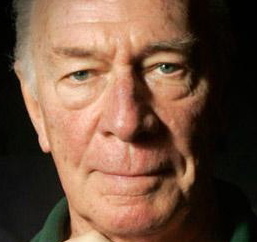 Plummer: There is an Everyman in Hamlet. And every member of the audience must, whether they like it or not, try to identify with him in this sense. And there is the chance in that extraordinary role of them being able to do that. Then there’s the remoter side of Hamlet, which is the urbane and the wit and the wisdom in one so young. And the style that perhaps takes him away from being identified, but particularly with modern audiences, who probably don’t know what style is. So it is such a melange of extraordinary qualities, Hamlet, that it makes the greatest role ever written. There is no doubt of that. And he must have also the great temper. He must possess the great temper in order to frighten the audience. He must have all sorts of qualities all in one. Because it’s written that way. It’s written as a great symphony of a part. And unless you obey the codas, the climaxes, and the stresses, musically, you’re not anywhere near finished playing Hamlet.
Plummer: There is an Everyman in Hamlet. And every member of the audience must, whether they like it or not, try to identify with him in this sense. And there is the chance in that extraordinary role of them being able to do that. Then there’s the remoter side of Hamlet, which is the urbane and the wit and the wisdom in one so young. And the style that perhaps takes him away from being identified, but particularly with modern audiences, who probably don’t know what style is. So it is such a melange of extraordinary qualities, Hamlet, that it makes the greatest role ever written. There is no doubt of that. And he must have also the great temper. He must possess the great temper in order to frighten the audience. He must have all sorts of qualities all in one. Because it’s written that way. It’s written as a great symphony of a part. And unless you obey the codas, the climaxes, and the stresses, musically, you’re not anywhere near finished playing Hamlet.
Correspondent: Well, this is an interesting distinction. Because I also know that you took James Earl Jones to task in this book for approaching Othello with a more analytical framework.
Plummer: Yes.
Correspondent: And I’m wondering if you believe that Shakespeare needs to always have this great emotional poetry to it or whether there is room, given the complexities, for numerous types of adaptations.
Plummer: Well, of course there’s room. But you’ve got to have all of them. You can’t come on and just sort of say, “Alright, I’m going to play Hamlet as a junkie. Period.” Please! Where would he be able to think so clearly? And how could he give out such brilliant thoughts if he was a junkie? It would take him days to say one line. So, of course, James Earl Jones was fantastic in the prose section of the play. What interested me, and what disappointed me at the same time, was — with his great organ of voice, which he has to his fingertips — why he did not let go in the great poetic passages.
Correspodent: Yeah.
Plummer: He just decided not to. Whether he was embarrassed or he decided he would do them in more monotone realistic way. There was only one great moment where he let fly. It was about the Pontic sea, and that whole imagery in the famous scene with Iago. There, he let fly. And it was absolutely wonderful. And then you wanted him to go on at moments doing the same thing again.
Correspondent: So I take it then that you’re not really a fan of creative interpretations like, say, the R & J or the Baz Luhrmann approach to….
Plummer: Oh, I thought that as a contemporary Romeo & Juliet, it was [the Luhrmann] by far the best I’d ever seen. I thought it was excellent. And I didn’t think that the poetry was mangled. Because I think that somebody helped — obviously, I don’t know if this is true, but it seemed as if someone had helped Leonardo DiCaprio with his words. Because he stretched them out correctly. So even though it was a modern piece, he obeyed the rhythm of the poetry. And I thought that the girl did too. She was a little behind him in that. But he was excellent. And I thought that was remarkable. Because that was an honest departure all the way down the line. It didn’t pretend to be half-modern, half a sort of allegiance to Shakespeare. It was a modern take on Romeo and Juliet.
BSS #253: Christopher Plummer (Download MP3)

The Bat Segundo Show: 2008 National Book Awards
Our reports from the National Book Awards previously appeared in piecemeal on these pages, and have also appeared on The Bat Segundo Show #252.
So far as we know, the National Book Awards has not authored anything aside from programs and informational pamphlets. The people that Our Young, Roving Correspondent talked with on that fateful night, however, have authored a few books. Or at least, this is what they have told us.
Condition of Mr. Segundo: Deeply suspicious of Harold Augenbraum.
Authors: Joan Wickersham, Annette Gordon-Reed, Salvatore Scibona, Mark Doty, Candace Bushnell, and Richard Howard.
Subjects Discussed: The difficulties of writing a memoir in straight chronological order, the paradox of suicide, having a handrail to guide you through the writing of a book, the Hemmings family, endnotes, the perils of plunging into research, working on a book for nine years, narrative arcs, attempts by finalists to describe a book in 100 words, planning a book for ten years, writing and throwing things away, typewriters and distractions, mixing up Cs and Ds, the difficulties of selecting poetry for a volume, wrestling with Walt Whitman, why Candace Bushnell reads what she reads, attempting to get an answer on how one exudes glamor at the National Book Awards, and how long it takes Richard Howard to write a poem.
EXCERPT FROM SHOW:
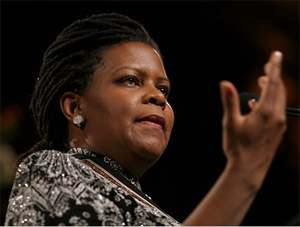 Correspondent: How are you wrestling with Whitman exactly?
Correspondent: How are you wrestling with Whitman exactly?
Doty: Well, I want to think about the common ground that I share with Whitman. A real interest in the relationship between the individual — the single self — to the community. Whitman is always trying to figure out where the margins of himself are, and often he feels like he doesn’t have any. That’s been an obsession of mine too. He’s a person who was so interested in affirming the body, and the pleasures of sex and of physical life. And at the same time, he was a person who was absolutely obsessed with mortality and the end of physical life. So those are all things that matter to me. And I love the way that he really thought his poems could change the world.
Correspondent: And you’re here for the National Book Awards specifically in what capacity? To exude glamor or what?
Bushnell: To celebrate books. This is the business that I’m in. Publishing. I’ve written five novels. And this is about publishing. So it’s always a treat for writers to come out and see other writers.
BSS #252: 2008 National book Awards (Download MP3)

The Bat Segundo Show: Alex Beckstead
Alex Beckstead appeared on The Bat Segundo Show #251.
Mr. Beckstead is the filmmaker behind Paperback Dreams, a documentary on independent bookstores. The documentary is now touring around the nation and is making appearances on PBS.
Condition of Mr. Segundo: Surrendering to hard-boiled journalists.
Guest: Alex Beckstead
Subjects Discussed: Why Beckstead singled out Cody’s and Kepler’s over other Bay Area bookstores, Kepler’s as a prominent fixture on the Menlo Park town square, the Cody’s “hail Mary” play in San Francisco, business location problems in Union Square, the commercial viability of Telegraph Avenue in Berkeley, the Bay Bridge as the cultural Berlin Wall, the question of why Cody’s didn’t survive in the present age when it survived the seedy environment of the 1960s and the 1970s, economic vs. cultural shifts, passion and independents, the absurdity of buying everything online, Amazon, bookstore proprietors who don’t own their buildings, the graying of bookstore customers, Andy Ross vs. Clark Kepler as successful bookseller, the independent bookstore as cultural space, listening to the customer base, the importance of being an entrepreneur, comparisons between bookstores and movie theaters as glorified snack bars, the two storefront dilemma, the bookseller as philanthropist, an independent bookseller’s responsibility to the community, the conglomeration of publishers and the lack of dangerous books on the market, Salman Rushdie’s The Satanic Verses and the Cody’s firebombing, books vs. music as a medium, whether or not the Internet is bad for books, gatekeepers, the importance of the countercultural movement to independent bookselling, and the ubiquity of Amazon vs. the selection of a bookseller.
EXCERPT FROM SHOW:
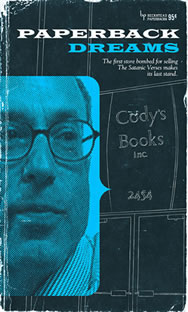 Beckstead: I didn’t smell blood in the water. I didn’t go in thinking, “Okay, well this is going to be a failure.” I mean, it was a huge risk. The kind of thing that Andy [Ross] was doing, there was going to be a dramatic outcome one way or the other. Either he wasn’t going to make it and then the losses were going to be catastrophic or he was going to make it and sort of prove that somewhere, somehow, an independent bookstore can still make it. That was the outcome I was still rooting for. But that’s not what happened.
Beckstead: I didn’t smell blood in the water. I didn’t go in thinking, “Okay, well this is going to be a failure.” I mean, it was a huge risk. The kind of thing that Andy [Ross] was doing, there was going to be a dramatic outcome one way or the other. Either he wasn’t going to make it and then the losses were going to be catastrophic or he was going to make it and sort of prove that somewhere, somehow, an independent bookstore can still make it. That was the outcome I was still rooting for. But that’s not what happened.
Correspondent: But simultaneously, you do have footage of Andy Ross, as the bookstore is opening. He’s saying very proudly in the streets how banks won’t lend him money, how he’s putting his entire savings into this “hail Mary” — we’ll call it that, I suppose, because it did indeed go belly up. And at the end of the film, he even says, “This was a colossal act of hubris.” I mean, this store was operational at the expense of the Telegraph store.
Beckstead: Well, the Telegraph store wasn’t making money. That’s what people need to understand. You know, the Telegraph store was not going to survive. It might have limped along for another year or two, had Andy not opened San Francisco. But it was losing a lot of money. The kind of books that historically sold were not selling well there. And I think Andy’s reasoning was that, when they opened the second store in Berkeley in ’98 — you know, Cody’s on Fourth Street — that store became very successful very quickly. It was smaller than Telegraph. There’s a whole other thing about Telegraph. It’s always been a little edgy, but it’s kind of got a little bit seedy. There’s a high rate of vacancies along Telegraph Avenue. I was talking at one point, when we were making the film, with the owner of Ameoba Music. He has a very large record store on Haight Street in San Francisco and then also on Telegraph. It’s still not clear to me exactly who’s to blame for the decline of Telegraph. But it’s clear. He was saying that there’s hardly any vacancies on Haight Street. It’s very similar in terms of the kind of people who spend time there. Similar problems with aggressive panhandling. With drug dealing and all those sorts of things. But Haight Street does fine. For some reason, Telegraph does not.
Telegraph was in decline. Fourth Street was really taking off as a shopping district. I can’t remember the exact number, but it’s something like 20 to 30% of the sales tax revenue for the City of Berkeley comes from Fourth Street. And Cody’s was the biggest shop on the block. They were the anchor on Fourth Street. So I think Andy’s logic was: We opened a second store in a more upscale shopping neighborhood. That quickly became profitable. Not quite profitable enough to hold Telegraph as well. But maybe if we did the same thing on a bigger scale, then we’d have two successful stores and one that was kind of slowly dying. But maybe we could subsidize it long enough to figure out what was going to happen. I mean, there’s been talk of turning around Telegraph Avenue for years. So I think that he was really optimistic that you could do that. But, yeah, it wasn’t the right call at the end of the day.
BSS #251: Alex Beckstead (Download MP3)

The Bat Segundo Show: Alison Bechdel II
Alison Bechdel recently appeared on The Bat Segundo Show #250.
Ms. Bechdel is most recently the author of The Essential Dykes to Watch Out For. To listen to our previous interview with Ms. Bechdel, check out The Bat Segundo Show #63.
Condition of Mr. Segundo: Overly concerned with modifiers attached to artists.
Author: Alison Bechdel
Subjects Discussed: The relationship between visual developments and storyline developments, how personal developments worked their way into Dykes to Watch Out For, Tips o’ the Nib, narrative authenticity, research through asking people, being afraid of the telephone, the comics world as a simulacrum of the real world, being overly stimulated by the real world, developing specific background details, the risks of diverting attention between graphic novels and comic strips, dwelling upon a community vs. dwelling upon the self, therapy, Woody Allen, being ahead of the technological curve, Proust and the first telephone call in a novel, laziness vs. being seduced by technology, scanned lettering, managing all the characters in the strip, having characters refer to each other by first name, the advantages and disadvantages of deadlines, adapting media messages for the comics medium, Mad Magazine and Mort Drucker, fear of empty space, when text and images are not enough for comics, political semiotics and behavior, strips with little to no dialogue, artistic influences, fitting multiple people into a frame, portraying the butts of various characters, contending with censorious requests from newspaper clients, the limitations of four rows, Madwimmin Books and big box stores, why the bookstore is the perfect social nexus, the outcry upon introducing Stuart, the ideological balance between Mo and Stuart, gender jokes as cheap shots, contending with those who didn’t understand Bechdel’s storytelling style, the role of politics in Dykes, the moral responsibilities of a cartoonist, and Proposition 8 and the future of cartooning.
EXCERPT FROM SHOW:
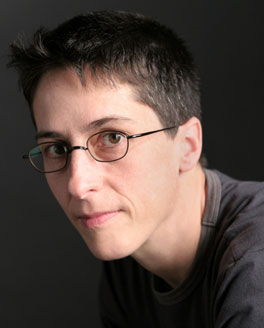 Correspondent: I think we should really clarify this for the record. I mean, the stripes on Mo’s shirt become more pronounced over the course of time. And they increasingly grew thicker during the course of the early ’90’s. And then sometime around 1995, they solidified into that absolute thickness that we have enjoyed for the last decade or so. I know there have been many Harry Potter jokes that you’ve thrown around. But you were there, of course, before Harry Potter.
Correspondent: I think we should really clarify this for the record. I mean, the stripes on Mo’s shirt become more pronounced over the course of time. And they increasingly grew thicker during the course of the early ’90’s. And then sometime around 1995, they solidified into that absolute thickness that we have enjoyed for the last decade or so. I know there have been many Harry Potter jokes that you’ve thrown around. But you were there, of course, before Harry Potter.
Bechdel: That’s right.
Correspondent: But I have to ask you about the stripes. Had it occurred to you at any time to have Mo not wear a striped shirt? Or did you feel that this was such an indelible part of her disposition?
Bechdel: I think there might be one scene where she’s not wearing a striped article of clothing. But I can’t remember what it is or what its significance is. Indeed, the stripes did grow thicker. Very good observation!
Correspondent: Yeah! They did! They did! It was really great to read this all in one burst, because there are so many different character developments, which I plan to ask you about. But maybe I could probably phrase this better by pointing out Sparrow, for example. How the front curls that she had were chopped off to fit in with the adjusting times. And I’m wondering when you decide to change the look of a character. What circumstances dictate that? And some characters, of course, like Mo, stay the same over the course of time.
Bechdel: Wait, can I just make an observation? Thinking about those thickening black stripes, I think that’s of a piece with the increasing darkness of the strip and indeed the era in which it was passing through.
Correspondent: Yeah, yeah, that’s true.
Bechdel: Maybe now if I were continuing to write it, Mo’s stripes would continue to get thinner and thinner.
Correspondent: Thinner, thinner, thinner.
Bechdel: No, I mean literal — I mean like figurative darkness.
Correspondent: Figurative darkness!
Bechdel: Yeah! Yeah!
Correspondent: So there’s some allegory here, I see. So it’s
Bechdel: Yeah, I’m totally bullshitting. I’m totally making this up.
Correspondent: Ah! No, no, this is good. This is good.
Bechdel: But…
Correspondent: But we can give the listeners something to latch onto here. Great allegorical decisions upon your part. I mean, how much of this is intuitive? And how much of this is really a conscious effort? Well, you know, Mo’s stripes look better. They just look better.
Bechdel: No, it was purely a visual decision. I don’t know. I just used a different pen or something. And it looked better thicker.
Correspondent: Okay, what about Sparrow’s hair?
Bechdel: Sparrow’s hair. Well, what made me decide to do that? I don’t know, but interestingly it prefigured her crossing over from being a lesbian into being a…
Correspondent: Yeah.
Bechdel: …a bisexual. I forget what she called herself. A bisexual lesbian.
Correspondent: I think she did.
Bechdel: But she didn’t want to completely let hold of her lesbian title. But she got this slightly more feminine-looking haircut.
Correspondent: Yeah, she did. She did. I mean, did you plan her to essentially shack up with Stuart?
Bechdel: No, not at that point. I didn’t.
Correspondent: How much does a visual decision like this predate the actual plotting? Or perhaps anticipate it in some way? It’s a very interesting observation.
Bechdel: It is interesting. What’s even more interesting is that the way that these storylines and developments prefigure my own life. Or are a reaction of things going on in my own life. Which I don’t like to admit, typically. But as I looked back over the book, I could see all these absurd parallels with my own life. It seemed almost indiscreet to have included them.
BSS #250: Alison Bechdel (Download MP3)

The Bat Segundo Show: Porochista Khakpour
Porochista Khakpour recently appeared on The Bat Segundo Show #249. Ms. Khakpour is the author of Sons and Other Flammable Objects.
Condition of Mr. Segundo: Avoiding the seemingly erudite man with the flamethrower.
Author: Porochista Khakpour
Subjects Discussed: Professional doodling, italics that represent facial expressions, acting out dialogue, the protracted difficulties of editing, the creative benefits of neurosis, thinking of an audience vs. writing in a distinct voice, maintaining lists of words, bulleted lists within the novel, the relationship between the equal sign and character consciousness, writing lengthy scenes that involve the anxiety of waiting, working from a journal to get at feelings within fiction, playing games in novels, aversion to mainstream narratives, the burden of universality, the novelist as an authoritarian figure, David Foster Wallace as a distinct author who reached a mass audience, “Good People,” the cycle of abuse that runs through Xerxes, missing daughters, how women relate to men, character names and explicit historical associations, the Americanization of Iranian names, truncated names, contrast and comparison with Sam and Suzanne, how 9/11 transformed the idea of looking at other people with an open mind into something else, relying on general descriptions for physical details, keeping specific details from the reader, how far an author must go for emotional truth, going against the contract of a book, the diminished acknowledgments section between hardcover and paperback, losing old friends, reading group questions, moving into an age where 9/11 novels are going to date, Mahmoud Ahmadinejad and American diplomacy, and lucky timing with pub dates.
EXCERPT FROM SHOW:
 Correspondent: So you actually added 10,000 words just in the editing process?
Correspondent: So you actually added 10,000 words just in the editing process?
Khakpour: Yeah, I did.
Correspondent: Really?
Khakpour: Every time I edit. Everything. I have. Even with my journalism. They’ll tell me cut this piece down. And we’ll get to the editing phase. And I’ll always end up adding. Even when they tell me specifically, “Cut it down.” I don’t know what it is. Editing to me just means adding instead of cutting. It’s crazy.
Correspondent: Is it possible that perhaps you’re getting questions from an editor and this influx of information causes you to think more, and therefore causes any kind of piece or novel or whatever you write to expand and protract or the like?
Khakpour: Yeah. Probably, I think. I always think of my audience. And that person that I think of as my audience is very quiet and sits with their folded hands, and is very polite and approving.
Correspondent: Folded hands? I didn’t have my hands folded when I read this. I want to assure you.
Khakpour: (laughs) It’s a good somber schoolgirl.
Correspondent: Wow, I didn’t realize this.
Khakpour: Crossed legs. Very approving. (laughs)
Correspondent: There should have been an etiquette guide in the paperback here.
Khakpour: But then the minute the editor speaks up, I’m like, “Uh oh. This is a very intelligent human being who is not going to buy all my bullshit, is actually going to question me now.” And then I fall into super-neurotic mode. And that always means, well, not only am I going to think of this editor, but I’m going to think of all the other voices of dissent. All the people. And it goes from there. And so it just involves adding and adding and adding. To appease all the various voices in my head. (laughs)
Correspondent: Thinking about the audience then makes you more neurotic.
Khakpour: Overanticipating often. Yeah. I’m trying to tone that down right now.
Correspondent: That’s interesting. But then to a certain degree, you have to leave things relatively organic and intuitive, and you can’t think about an audience. It’s important to have gestation here. And I’m curious if this might possibly be an issue.
Khakpour: I think it is. I’m a control freak.
Correspondent: You want people to like you? Really, really like you?
Khakpour: Well, not even like me. But I like some control over how people are digesting my work. That’s ridiculous. But I think it also has to do with communication. And because English wasn’t my first language. I always feel like I repeat. I’m like Joe Biden. I’m often repeating the same thing over and over and over at people. “I got it the first time.” You know, there’s no need to say the same sentence over and over and over. But I always feel that people aren’t hearing me, or somehow don’t understand what I’m saying. So….
Correspondent: You know, I…
Khakpour: I think I’m going to have to back off now. I’m learning that.
Correspondent: I’ve heard that Nicholson Baker — what he does is that he Control-Fs a specific phrase throughout all of his work to make sure that he has not written that particular phrase before.
Khakpour: Oh, that’s great.
Correspondent: Do you have this level of detail?
Khakpour: I’ll do that with certain words. Because I’ll have certain words that are my favorite word of the moment. And I’ll still — I’ll do that thing that I did when I was a young immigrant. I used to keep a list of vocab words that I loved. And even now, there will be some word every once in a while on a little list by my desk. Like I like that word! Let’s use that word somewhere.
Correspondent: You actually have a list of words by your desk?
Khakpour: Yes, sometimes I do that.
Correspondent: The words I have to include in the book. Really?
Khakpour: Yeah. And they’re not like ten dollar words.
Correspondent: Okay.
Khakpour: Or hundred dollar words. But they’re just interesting or strange. Or words. Or unusual usages. I’m often very much tried to find the Find function or the Replace function. So I’ll have to double check and make sure I don’t use that word several times. But it’s usually on a word level there.
BSS #249: Porochista Khakpour (Download MP3)
The Stuff That Love Is Made Of
Attorney General Mukasey Collapses
Tonight, while delivering a speech at a Washington hotel, Attorney General Michael Mukasey began slurring his words and lost consciousness. He collapsed and was rushed off to George Washington University Hospital. Mukasey’s Wikipedia page has been undergoing numerous revisions, with versions of the page claiming that Mukasey is dead. But there isn’t any hard or credible information to suggest that Mukasey has passed away. If there is any reliable information to report, I will update this post.
Billy Joel: “Fuck You”
A few days ago, I openly pondered why Billy Joel’s “A Matter of Trust” was released to the airwaves. I vowed to track down the people responsible, but, frankly, I forgot about the issue altogether. But tonight, Billy Joel responded from Australia (where he is now preparing for a few tour dates) through one of his Robert Burns LLC email accounts with the following comment:
Here’s my ‘ouvre’ – Fuck You. Sincerely, Billy Joel
Presumably, the jet lag that Mr. Joel was suffering from caused him to misspell “oeuvre.” Or perhaps he is not accustomed to typing. But I’m disappointed. Frankly, I expected more from Mr. Joel. Perhaps some lengthy explanation on why he steered down this regrettable musical path and gave us “A Matter of Trust.” Perhaps a defense of the endless F Sharps and C Sharps within this particular song. Yes, it can’t be easy to take some constructive criticism when you’re sitting on millions of dollars. And it can’t be easy when you’re a major pop star now relying on AutoTune to sing the national anthem on live television. But let us give Mr. Joel the benefit of the doubt. Perhaps Mr. Joel is suggesting with his answer that his entire career has been predicated on saying “Fuck You” to the general public. And if that’s the case, then I thank Mr. Joel for his candor. Perhaps things would be different if a little bit of this “Fuck You” attitude was in the new material. But “Fuck You” is Mr. Joel’s explanation. And “Fuck You” represents Billy Joel’s career from 1985 onwards. Which is a pity. Because I actually kind of liked his early stuff.
Fiction Award
And the winner is Peter Matthiessen’s Shadow Country.
An interminable preliminary speech from Gail Godwin…..
And then….
Matthiessen’s speech: He’s smiling as he walks up the stage, holding up his award, looking at Gail, and then addressing the audience. “Well, needless to say, I’m very happy and honored to have this National Book Award.” He did not prepare a speech. Thanks thanks thanks. “I’ve had a hard time over the years persuading people that fiction was my natural thing, not nonfiction.” Bringing up Viking, being sued by the FBI. “I also want to say how much I’ve enjoyed much too briefly my fellow nominees.” “Years ago, I was nominated for the fiction award for a novel called At Play in the Fields of the Lord. And it didn’t win.” “I’m back! And other writers will be back too. I just hope it doesn’t take thirty-three years.”
Nonfiction Award
And the winner is Annette Gordon Reed’s The Hemingses of Monticello.
Reed’s speech: Tonight is actually her birthday. She lived too much in the 18th century. Thanks to Robert Wile (editor at Norton). Couldn’t stop researching and had to write. “I can’t say what a wonderful November this has been.” “We’re on a great journey now and I look forward to the years to come.”
Poetry Award
And the winner is Mark Doty’s Fire to Fire.
Doty’s speech: “Robert is right. This is really good baloney.” Very nervous. “I am glad to be alive in a time when poems like [my finalists] are written.” Shoutout to Terry, editor at HarperCollins. Shoutout to the late Robert Jones, who brought Doty to Harper. Recently married his partner. “It is very plain that we are on the path to equality for all Americans, and that nothing is going to turn us back.”
Young People’s Literature Award
And the winner is Judy Blundell’s What I Saw and How I Lied.
Blundell’s speech: Always a bad idea to follow Daniel Handler. “Most of you don’t know me, but I’ve probably worked for many of the houses in this room tonight.” “This is the first book I put my name on. When I started in publishing, I was a hapless and very underconfident person. Not much has changed, but I went in the back door of publishing as a writer for hire.” She worked in genre joyfully, because she loved those books. Children don’t discriminate and categorize. “You can develop a type of writer’s amnesia. Not that you’ve lost your present, and your past, but your future.” Her 48th book with her editor. Thanks to David (her editor) for giving me back my voice. (She has not thanked her agent. Does she have one?)
How Much Was “Housekeeping” Edited?
While wandering around the ballroom in search of quotes (and observing Leon Neyfakh’s fine method of collecting quotes from people while standing near the restrooms), I ran into Pat Strachan, who had edited Marilynne Robinson’s Housekeeping. I remain convinced that Robinson can win tonight. But Strachan expressed a few doubts. In fact, a number of people I’ve talked with tonight seem to doubt that Robinson can win. Of course, we’ll know soon enough in the next hour.
In any event, being a bit of a Robinson geek, I had to ask Strachan about how exactly she edited Housekeeping. She told me that the manuscript was more or less as is, and that there were minor changes. “What kind of changes?” I asked. Not much apparently. Just a few words for clarification.
Some authors are just that good.
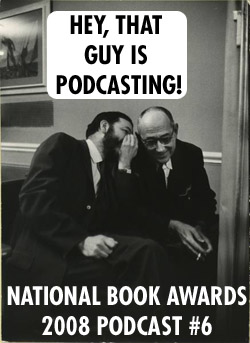
2008 National Book Awards Podcast #6: Richard Howard
(This podcast is part of our 2008 National Book Awards coverage. Keep checking this category for details.)

Who is the Correspondent Talking With? Richard Howard
What’s Going On? In a noisy tableau, our young, roving correspondent hopes to get some answers about the craft of poetry from Richard Howard.
National Book Awards Podcast #6: Richard Howard (Download MP3)
Spouse of a Nominee
Outside the ballroom.
“Are you nervous?”
“Actually, I’m here because of my wife.”
“Moral support then?”
“You could call it that.”
“Was it a big surprise for her to be nominated?”
“Well, actually she had the support of many librarians.”
“So she expected it.”
“It was an honor for her to be nominated.”
“And how about you? Are you holding up okay?”
“It’s getting cold. I have to go back inside.”
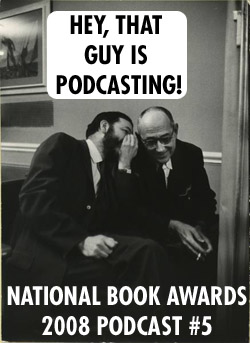
2008 National Book Awards Podcast #5: Candace Bushnell
(This podcast is part of our 2008 National Book Awards coverage. Keep checking this category for details.)

Who is the Correspondent Talking With? Candace Bushnell
What’s Going On? Attempting to ascertain precisely why Ms. Bushnell is here, but she is more fond of thanking your young, roving correspondent, rather than answering his questions.
National Book Awards Podcast #5: Candace Bushnell (Download MP3)
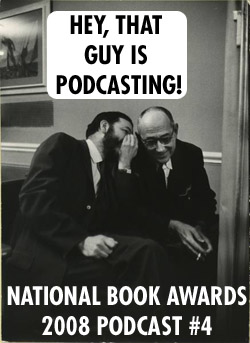
2008 National Book Awards Podcast #4: Mark Doty
(This podcast is part of our 2008 National Book Awards coverage. Keep checking this category for details.)

Who is the Correspondent Talking With? Mark Doty
What’s Going On? So here’s the deal. Mr. Doty here has arranged a considerable amount of poetry together. But have you ever stopped to consider just how it was put together. Furthermore, there is a good deal of talk here about Walt Whitman, Allen Ginsberg, and the degree to which poets should revere Mr. Whitman. Mr. Doty was a good sport during this interview, and we hope to revisit his work at some less rushed point in the future.
National Book Awards Podcast #4: Mark Doty (Download MP3)
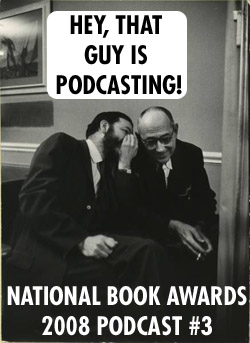
2008 National Book Awards Podcast #3: Salvatore Scibona
(This podcast is part of our 2008 National Book Awards coverage. Keep checking this category for details.)

Who is the Correspondent Talking With? Salvatore Scibona
What’s Going On? Talk of writing novels over the course of ten years, the advantages of writing on typewriters, and other tomfoolery.
National Book Awards Podcast #3: Salvatore Scibona (Download MP3)
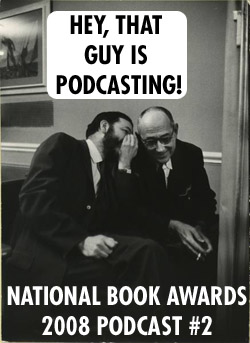
2008 National Book Awards Podcast #2: Annette Gordon Reed
(This podcast is part of our 2008 National Book Awards coverage. Keep checking this category for details.)

Who is the Correspondent Talking With? Annette Gordon Reed
What’s Going On? Talk about the Hemmings.
National Book Awards Podcast #2: Annette Gordon Reed (Download MP3)
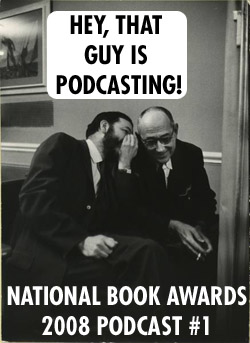
2008 National Book Awards Podcast #1: Joan Wickersham
(This podcast is part of our 2008 National Book Awards coverage. Keep checking this category for details.)

Who is the Correspondent Talking With? Joan Wickersham
What’s Going On? Talk about Wickersham’s book, The Suicide Index, and how disorderly emotions can’t always be arranged in an orderly manner.
National Book Awards Podcast #1: Joan Wickersham (Download MP3)
National Book Awards Dispatch #1
I am now situated in the press section of the Cipriani Ballroom. Galleycat’s Jason Boog is here, and we are urging him to get his journalistic party started. There are numerous round tables, which one expects from a ballroom, and plentiful waiters ready to kick some culinary ass. But we have not yet located any authors. It is still early. Harold Augenbraum did not recognize me — presumably because I spent a portion of the afternoon with a pair of clippers. There are two friendly reporters here from Publishers Weekly: Lynn Adriani and Craig Teicher. Other journalists are grumbling about cocktails. I have just urged another journalist that there will be pugilism should his equipment be stolen by an interloper.
Jason Boog is no longer here. But we have reason to believe that he will return. We have reason to believe that there will be authors. So far, we have been proved wrong.
Jason Boog’s first words are, “It was a really eerie feeling to walk right past Wall Street on this day into this opulence.”
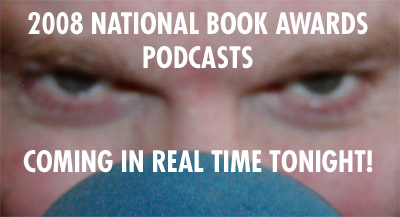
National Book Awards Podcasts

Name That Tune!
Not long ago, I listened to a remarkably wretched piece of music, perhaps dating from the late 1980s, while waiting for someone. Now I had not heard this song for a number of years. It was sung by a needlessly husky New Age-like Michael McDonald-sounding singer. Perhaps it was McDonald for all I knew. The song was certainly written and recorded with the intention of being played all the time on easy listening radio.
Days later, the manufactured melody has become a dreaded earworm. What is most curious about this insipid little song is that, perhaps in an effort to protect myself, I have deliberately blanked out on the lyrics. Maybe I just don’t want to remember. Or perhaps this reflects a certain trauma related to the song that may come up once I have discovered its identity. But the phrase “matter of touch” seems to be there. Here are the notes in question for the main verse, which repeats about four times in the song:
F# / F# / F# / F# / F# / G / F# / E / D / C# / A
F# / F# / F# / F# / F# / G / F# / E / D / C# / A
(one octave lower) F# / A / C# (suspiciously similar — perhaps deliberately so? — to the beginning of the crescendo of the Carpenters’s “Close to You”)
A / B / C# / C# / C# / C# / C# / B / A / C#
A / B / C# / C# / C# / C# / C# / D / E / D
Now in that last line, this McDonald-like warbler ends this tune with the lyrical fragment in question. It could be something along the lines of “But it’s really just a matter of touch.” That sounds right, although I suspect it’s dreadfully wrong.
Do you know what this song is? And if you have had to endure it at any point in your life, have you experienced any specific trauma related to it? What I think we need to do here is determine what the song is, track down the people responsible (I will make phone calls; don’t you worry), and find out why this tune was emitted over the airwaves. There is, I suspect, a big story here that may yield unexpected truths.
[UPDATE: The ever helpful Doug Finch has correctly identified the song as Billy Joel’s “A Matter of Trust.” Rest assured, there will be efforts to track down Mr. Joel and get him to answer for this atrocity. This particular song in his oeuvre is the least Billy Joel-sounding — a fey cross between Michael McDonald and Bruce Springsteen. More TK.]
Again, the National Book Awards
During the past two days, there have been sparse entries on these pages. There are reasons for this: a few deadlines met, a few interviews conducted (one very journalistic, the other involving two people with funny brains approaching strange nexuses, or, nexii, as the interviewee playfully insisted on), some quiet stabs at the enormous humanistic thing that I am trying to finish before January 20th, and serious and constructive thinking about this website’s future aligned with the dawning reality that newspapers and magazines are dying, as jobs also fall off the board. I do not know if one can be simultaneously optimistic and grim, and I can report nothing in the way of mood swings here. If I had to choose one, it would be the former. But I have long claimed to be an optimistic realist — someone who maintains a basic faith in the overall goodness of people, while likewise being very well aware of our darkest impulses. And perhaps this yin-yang nestling in my head has caused me to be slower when it comes to some responses, while quick on the draw as ever with others. For this, I apologize. I shall try and be better.
If this ruminative dilemma has spawned a modest slowdown here, well, then I’ll certainly be making up for it on Wednesday night (wow, tonight?), where I shall be dutifully reporting from the press section at the National Book Awards, sticking my tongue out should journalistic nemeses bug me, and giving you something close to the strange and improvised coverage that was provided here last year. My laptop has grown rattier and I have deliberately maintained a small cake of dust upon the screen to distinguish myself from my flashier colleagues. There will be blog entries, tweets, and podcasts. And I will do my best to hook literary people together. I have no idea what will come of these experiments, but I am committed to fun. The mad rush of National Book Awards reporting should begin sometime around 6:00 PM EST.




